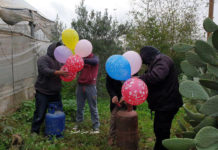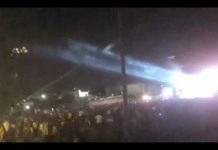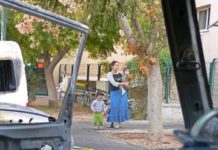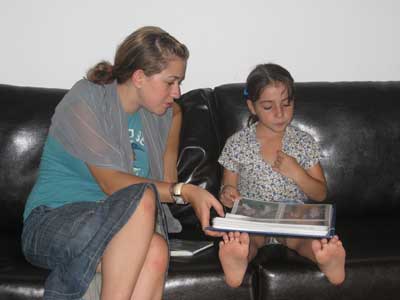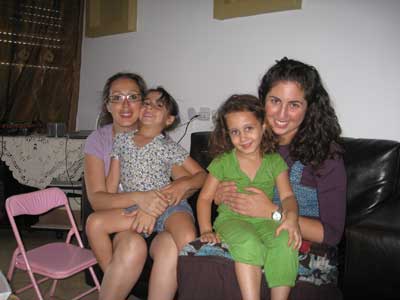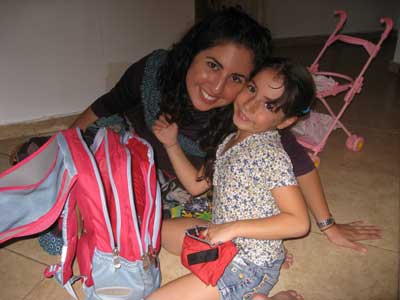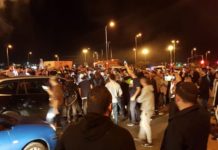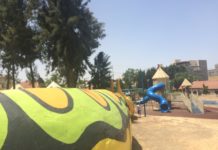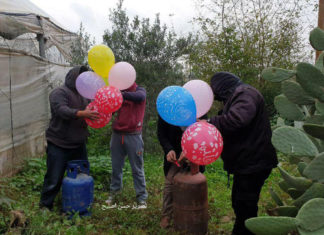I spent the last 48 hours in Sderot, Israel-one of the most special places I have ever visited.
Even as my friend, Chaya, and I were driving into the city, we could feel there was something different. There is something about Sderot that makes it like no other.
I fell in love instantly with the warm and welcoming people and the homey atmosphere, but at the same time, I was shocked at what I discovered about the city during my two-day stay.
The highlight of my visit was the opportunity to meet residents and hear from them, first hand, what life in Sderot is like and what they think about the situation. It opened my eyes to so much that I do not see in the papers, the Internet or television.
Maya Barda is a young woman, 29 years of age. She lives in Sderot with her husband Eliav and their children, Liron and Tair. The first thing I saw when I arrived was Liron with a drawing in-hand of a Qassam rocket and a dead flower.
First, we talked about the rockets. “All day long, the rockets are on my mind,” she said. “The state needs to protect all its citizens.
Then our conversation turned to her feelings on the situation within the city. She explained to me that while Sderot gets money from the government and donations from people around the world, it does not always go to the right places. “There are some that get and some that don’t,” she said. “It needs to be divided equally.”
She is most concerned about the children. “Activities and clubhouses should be available. We have some, but it’s not enough. We need to bring in educators that know and understand the hearts of the children and be willing to pay these people. We need to expose our children to more culture.”
Maya works at a preschool, where for almost three months, she could not take the children outside to play for fear of Qassam attacks. She told me that sometimes, during lunch, the Tzeva Adom (color red) alert would go off six or seven times. And on some days, parents would simply not send their children to school.
I can’t understand how children learn under these circumstances. How can a child get an education when they are cooped up in a building all day?
Even at home Maya does not have protection for herself and her children. When the Tzeva Adom sounds, they do not run to a bomb shelter. Her and her husband run to their children’s room to comfort them.
But when rockets are landing left and right, what other choice is there? There is too much risk involved in taking the kids out to play. Essentially, the children must pay a price to survive with their freedom, fun, education-their whole childhood, basically.
But through all this, when I asked Maya if they lose faith, she replied, “No, we sing Shir HaMa’a lot (from the book of Psalms written by King David).”
And they do not leave their home. They are too close to all the people around them, Maya told me, a family sticks together and would never leave a member behind.
My experience with Maya and her family was amazing. I was most impressed that despite the uncertainty that gripped Maya and her husband, the most important thing to them is protecting their children-not just keeping them safe physically, but also trying their best to distract them from the situation so they can have as normal a childhood as possible. At the same time, I saw something in the children that told me that nothing, not even the most loving parents in the world, could remove the fear from their lives.
Sarit Ben Hamo is 15-years-old, and the pain in her voice as she spoke with passion for her city and country nearly brought me to tears. Just as with Maya, I asked Sarit why she and her family did not leave Sderot.
“Why?” she responded. “So everybody leaves and we give [the Palestinians] our city on a silver platter?”
Sarit recent returned from New Jersey after spending a few weeks at a summer camp. She had a great time, she told me, but she was anxious to get back to her family.
Sarit is a perceptive young girl. “The kids are suffering here, but the media doesn’t show it,” she said. “People ask, “what are Qassams?” and say they’re nothing, but come for a day and you will see how fast you run [when the alarm goes off].”
“You don’t know from where it comes and where it will land,” Kobi, a family friend, chimed in. “We wait to hear the boom, and then we can relax, but sometimes we even shake from the boom and we know it landed close by.”
Sarit went on to explain the mental toll it takes on her and other children. She used to hear the Tzeva Adom in the middle of the night and run to the bomb shelter, only to discover that the alert did not go off, rather she’d heard it in a nightmare and thought it was real. Even when they sleep, children get no reprieve from the violence.
Sarit understands what is happening. “I can’t even go out with my friends. Our childhoods are being stolen.” And there is nothing they can do about it.
It is not fair that our brothers and sisters live like this.
Show your support. Go visit them, talk to them, show that you care.
Help put a stop to the anti-Zionist propaganda that permeates the mainstream media.
Let our voices be heard, the truth spoken.
Show the world what is really going on…



